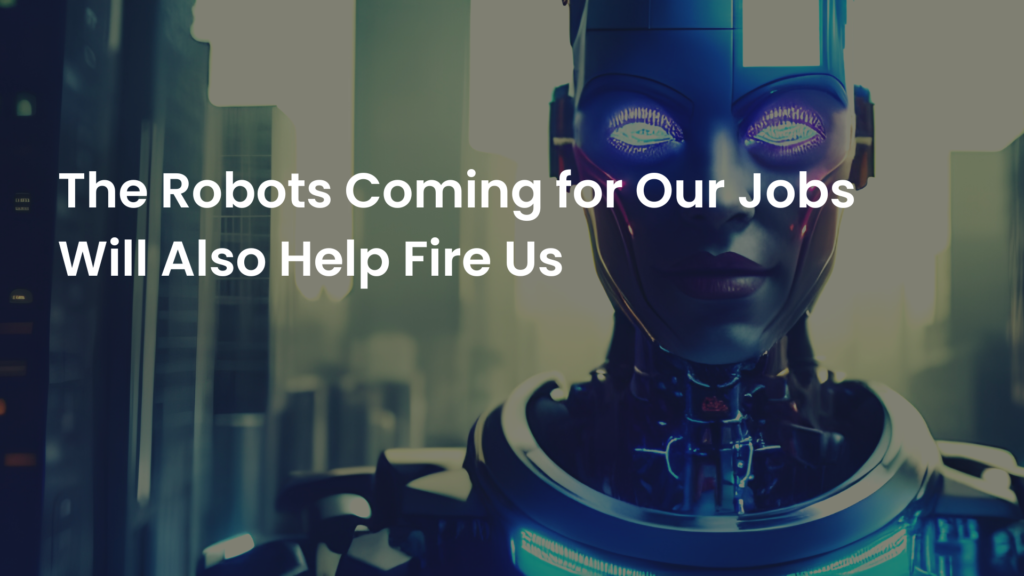Consider this dreadful possibility for individuals who take sadistic joy in searching for evidence that humanity is edging closer to a future where robot overlords govern the human race: Not only will artificial intelligence take your work, but it will also contribute to your dismissal.

The hiring, onboarding, training, and evaluation stages of the human resources process have all already been affected by AI. It’s hardly a tremendous leap to believe that technologies meant to simplify decision-making are suddenly finding their way into layoffs in an industry as efficiency-obsessed as technology. The environment is favourable for it here: According to outplacement data, the over 42,000 job losses in the IT sector last month were the second-highest on record for the industry.
Because human resources executives have acknowledged it, one of the reasons we know there is a drive towards automating some aspects of so-called “workforce reduction” is that: According to a poll released last month by Capterra, a division of tech industry research firm Gartner Inc. 98% of the HR leaders it questioned said they would rely at least somewhat on software and analytics to cut labour expenses in a 2023 recession.
Management by algorithm is nothing new for hourly workers. For instance, Bloomberg News reported in 2021 that Amazon.com Inc. tracked every move of its Flex delivery drivers, and that some of them were fired through automated email when the business’s algorithms determined that the employees were performing poorly. The massive amount of data that Amazon gathers on these independent contractors allows algorithms to assess performance, but it also makes it simpler for supporters of AI to argue that these tools are required because there are simply too many inputs for a human to properly analyse.
Up until recently, office workers were mostly exempt from this level of intensive monitoring, in large part because the data needed to follow them similarly didn’t exist. However, this is altering as the workforce productivity score gains popularity and there is a rising need and capability to thoroughly monitor employees’ every keystroke and mouse click, not just whether they are in front of their keyboards or not.
To be clear, I’m not advocating that HR managers simply hit a button, and out will pop a batch of pink slips (and with them, a whole host of legal and reputational difficulties), although it’s almost certain that someone will try. There is a greater chance that AI will help narrow the field and provide a first pass similar to what occurs in the recruiting process now before a person is engaged.
The opportunity to detach emotion from layoffs and transfer responsibility and negative feelings away from people to technology may seem like the proverbial holy grail for HR managers. But we are aware that’s not how AI functions. Poor data in, bad data out, according to the edict. There is also a tonne of information showing how flawed the data that businesses now use for employee assessments is. While 70% of HR leaders indicate they would use performance indicators in layoff decisions, Capterra analyst Brian Westfall informed that a bigger percentage of HR leaders state that they are considering modifying performance reviews because they believe the process is inefficient.
Even the HR executives who stated they would use software and algorithms to reduce labour expenses in a recession in 2023 were hesitant to use the technology. 47% of respondents stated they would feel totally at ease making layoff choices based on these recommendations, while only half said they are completely convinced that these technologies will generate unbiased recommendations.
AI has the ability to incorporate prejudice rather than eliminate it from a round of messy and unhappy layoffs. A number of professionals cited another Amazon instance, in which the internet giant attempted to create an automated tool to choose potential candidates for open positions. The algorithm was trained by the company’s engineers to look at historical information on applicants who had previously submitted resumes.
But because the tech sector is dominated by men and the majority of previous applicants were men, the algorithm penalised women who applied for technical employment. (Reuters claimed that Amazon had discontinued the initiative; according to the business, the technology was never used to assess applicants.)
It’s yet another example of how AI may cause us to lose sight of the fact that human resources are all about, well, humans. With allegations of some tech employees receiving their job termination notices through email rather than in person, we are reportedly moving closer to a robotic apathy at this point. Today, we freely admit that one of life’s most traumatic occurrences might be being laid off. In light of the fact that we openly admit we don’t truly trust algorithms, it doesn’t seem to make sense to leave such a dire decision in their hands.